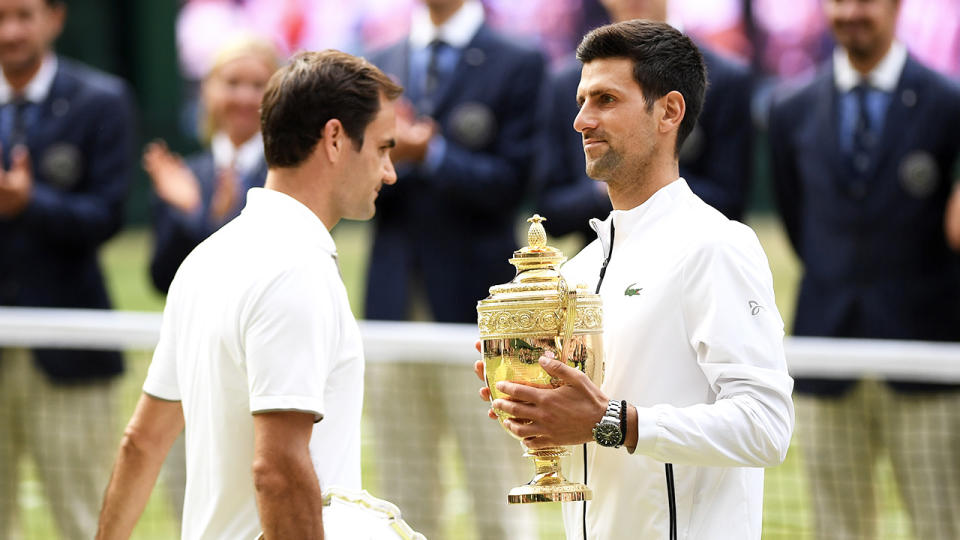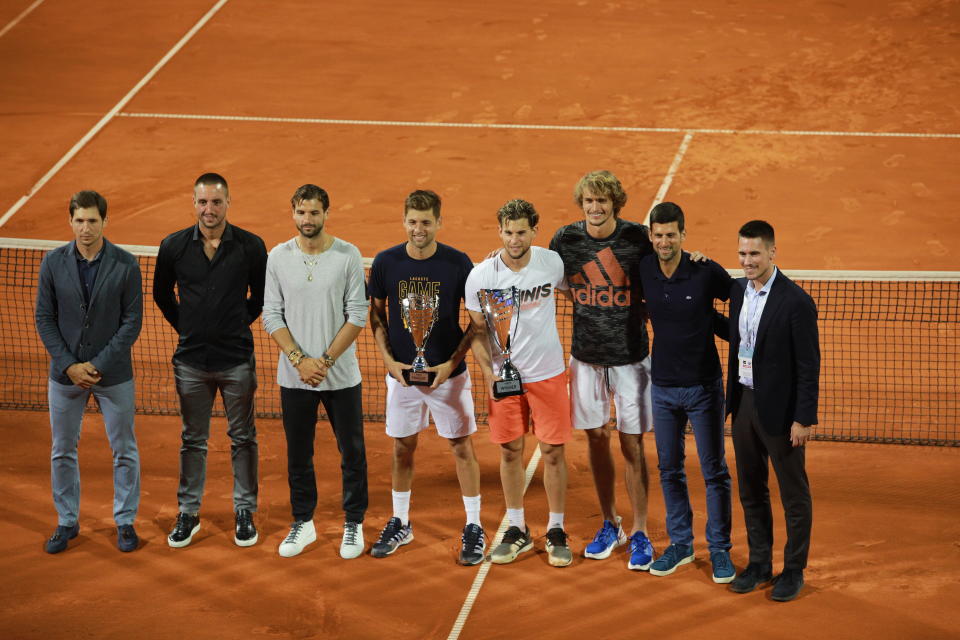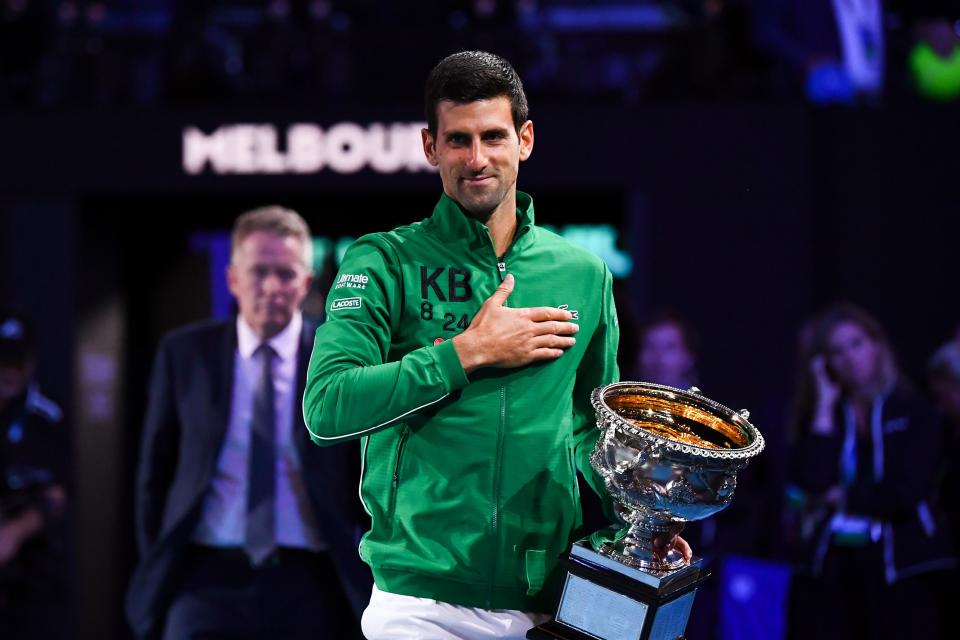Why Novak Djokovic has never been the people's champion

From growing up with NATO bombs raining down on Serbia to securing his place amongst the Grand Slam greats, Novak Djokovic never fails to both divide and unite.
On Sunday, the 33-year-old World No.1 one was disqualified from the US Open after accidentally striking a female line judge with a ball.
'CLASS ACT’: Novak Djokovic apology divides tennis world
'FACE UP TO IT': Djokovic slammed over US Open response
It made Djokovic one of a handful of players to be defaulted from the men's singles tournament of a Grand Slam since John McEnroe was infamously tossed from the Australian Open in 1990.
It also marked another low point in a roller-coaster 2020 for Djokovic who courted controversy with his Adria Tour event which resulted in several players - including himself - becoming infected with Covid-19.
In many ways, the events of recent months are emblematic of his career, which has yielded 17 Grand Slam titles - just three behind the all-time record of Roger Federer who is six years older.
Djokovic has pocketed career earnings of $143 million in prize money alone.
However, despite his achievements, he appears doomed never to be held in the same saintly esteem as Federer or Rafael Nadal, the undisputed 'people's champions' of tennis.
There are those that see something a little more calculating in the Djokovic make-up, an intense, brooding presence prone to affectation and fads and a little too 'new age' for most tastes.
Nick Kyrgios calls out Novak Djokovic
Nick Kyrgios has ridiculed the Serb's post-victory "cup of love" gesture as "cringeworthy".
Never short of an opinion, the Australian has also accused Djokovic of desperately needing to be liked.
Kyrgios led the criticism of Djokovic's ill-advised Adria Tour in June as "bone-headed".

All had seemed set fair for Djokovic this year before the lockdown in March.
He had secured a record eighth Australian Open and was on an 18-0 winning streak - that run had stretched to 26-0 until Sunday's default.
But in the space of a few months, his character and reputation have come crashing down.
First of all, he was criticised for breaking lockdown rules to train in Spain.
He then invited derision for insisting emotions can change the quality of water while almost simultaneously insisting that he would not be prepared to vaccinate against the coronavirus.
When he described limits on players' entourages at the US Open as "extreme" and "impossible", Djokovic found himself in the crosshairs again for being entitled in a world and sport trying to pull together.
After yesterday’s successful meeting, we are excited to announce the beginning of the Professional Tennis Players Association (PTPA). The first player only association in tennis since 1972. #PTPA pic.twitter.com/q8H0aOdqDl
— Novak Djokovic (@DjokerNole) August 30, 2020
However, few can doubt Djokovic's resolve.
Djokovic returns from rock-bottom in tennis
Two years ago, his career was in the doldrums.
Unable to shake off the lingering effects of elbow surgery, he suffered a shock early exit at 2018 Roland Garros.
With his ranking outside the top 20 for the first time in 12 years, Djokovic threatened to skip Wimbledon.
He changed his mind and with his career suddenly rejuvenated, he swept to a fourth title at the All England Club.
That was swiftly followed by more triumphs at the US and Australian Opens.
Only an inspired Dominic Thiem at the French Open in 2019 prevented him becoming just the second man in history to hold all four Slams at the same time on two occasions.
No matter, just weeks later, he captured a fifth Wimbledon in a record five-set final against Federer, saving two championship points in the process.
"Novak has everything to make records in this sport," said fellow player Juan Martin del Potro.

Djokovic captured the first of his 17 majors at the Australian Open in 2008, but it was three years before he added his second.
He dropped gluten from his diet, his lithe physique allowing him to chase down lost causes, transforming him into the rubber man of tennis.
After leading Serbia to a maiden Davis Cup in 2010, he raced through the first half of 2011, building up a 48-1 winning run.
Only a semi-final defeat at the French Open prevented him from becoming just the third man to capture a calendar Grand Slam.
Despite that, he still finished 2011 with a 70-6 win-loss record, a haul of 10 tournament victories and year-end number one for the first time.
Back-to-back Australian Opens followed in 2012 and 2013, although the French Open remained frustratingly out of reach with three heart-breaking finals losses until his 2016 breakthrough.
Djokovic success off the court
In Paris that year, he became the first player to break through the $100 million barrier in prize money.
The year before, he won 11 titles and compiled a win-loss record of 82-6.

Off court, Djokovic married long-time girlfriend and high school sweetheart Jelena Ristic in July 2014.
They have two children, a son Stefan and daughter Tara.
But on the court, his role as pantomime villain seems destined to leave him typecast.
"It doesn't mean that fans hate me and it certainly doesn't mean that I need to turn Serbia against the rest of the world just because fewer people support me in Grand Slam finals," he said.
When the All England Club crowd was noisily willing on Federer in last year's Wimbledon final, Djokovic turned the adversity in his favour.
"When they chanted 'Roger, Roger' I willed myself into believing they were chanting 'Novak, Novak'," he said.

